November 25, 2004
By Olivier Duffez, November 25, 2004 at 09:32 AM in:
Chris Richardson (WebProNews) discusses about a Google Instant Messenger rumor...
Even though Google has been busy with its various programs, there have been rumors of two major items that may be forthcoming from the company. The first being the Google web browser and the second is an instant messaging service. While speculation concerning the Google browser remains just that, (in fact, the development of the G-browser has been practically denied), an entry into the instant messaging universe appears to be something of a reality.
Related articles
-
Read what others are saying about this post on , or on or on .
November 23, 2004
By Olivier Duffez, November 23, 2004 at 11:12 AM in:
 Georges Harik, Director of (new products) at Google, chats with the Web Talk Radio Guys about Gmail. You can read an edited transcript online or listen to the complete interview with Microsoft Media Player. You can also download and listen the program as an MP3 file.
Georges Harik, Director of (new products) at Google, chats with the Web Talk Radio Guys about Gmail. You can read an edited transcript online or listen to the complete interview with Microsoft Media Player. You can also download and listen the program as an MP3 file.
Via SEW.
-
Read what others are saying about this post on Bloglines, or on Feedster or on Technorati.
By Olivier Duffez, November 23, 2004 at 11:07 AM in:
More on :
- An interesting article about Google Scholar by Shirl Kennedy and Gary Price on (via )
Related article
-
Read what others are saying about this post on , or on or on .
November 22, 2004
By Olivier Duffez, November 22, 2004 at 11:20 PM in:
(Press Release)
Company Strengthens Focus on Europe, Hires Arora To Lead Growing European Business
LONDON - November 22, 2004 - Google Inc., developer of the award-winning Google search engine, today announced that the company named Nikesh Arora as its new vice president of European Operations. Arora brings 16 years of diverse management experience to Google's expanding European operations and his appointment represents Google's continued commitment to growth in Europe. Arora will join Google in December, 2004, based in London.
In this newly created role, Arora will manage and develop Google's operations in the European market. Arora will also be responsible for continuing to create and expand strategic partnerships in Europe for the benefit of Google's growing number of users and advertisers.
"The leadership and experience that Nikesh Arora brings to Google will be an invaluable asset to Google's growing European business", said Omid Kordestani, senior vice president of Google's Worldwide Sales and Field Operations. "Nikesh's proven track record of leading high performance teams and driving businesses make him the ideal candidate to take Google's European operations to the next phase of growth."
Arora joins Google from T-Mobile, where he was Chief Marketing Officer and a Member of the Management Board. At T-Mobile, Arora was responsible for all product development, terminals, brand and marketing activities of T-Mobile Europe. Arora started working with Deutsche Telekom in 1999, during which time he founded T-Motion PLC, a mobile multimedia subsidiary of T-Mobile International.
Prior to his career at Deutsche Telecom, Arora held management positions at Putnam Investments and Fidelity Investments in Boston.
no comment - no trackback
Read what others are saying about this post on Bloglines, or on Feedster or on Technorati.
By Fabien Faceries, November 22, 2004 at 04:46 PM in:
According to RankPulse Index (RPI), Google has made a major change on its SERPs (Search Engine Result Pages)
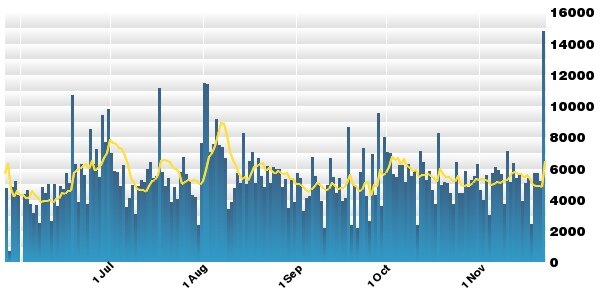
22 Nov 2004: wow, this is one of the biggest spikes we have seen in google rank activity since the beginning of the year! will it continue?
These changes were confirmed by SEOchat members
- Did you also noticed this major changes for your sites?
- To verify if your search rankings have changed you can use a software like Agent Web Ranking

Related article
-
Read what others are saying about this post on , or on or on .
November 21, 2004
By Olivier Duffez, November 21, 2004 at 06:37 PM in:
You can find more photos of the in the seattlepi blog:
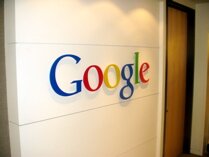
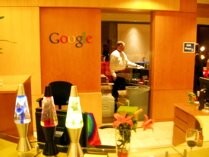
Via
Related articles
-
Read what others are saying about this post on , or on or on .
November 20, 2004
By Olivier Duffez, November 20, 2004 at 09:36 PM in:
Froogle has released Wish Lists! So you can create a wish list of products from any arbitrary website (that you can find in Froogle, which is pretty much any website).
Here are the explanations given by Google on Froogle FAQ:
What is this Wish List thing?
Your Wish List is the public part of your Shopping List. If there's an item on your Shopping List that you'd like to share with friends or family, just add it to your Wish List by checking the "In Wish List" checkbox next to the item. It will instantly be added to your Wish List, which will be accessible to anyone who searches for your e-mail address on the Froogle Shopping List homepage. You can also e-mail the URL, http://froogle.google.com/shoppinglist/shoppinglist?action=ShowWishList&email=YOUR_EMAIL_ADDRESS, to others. (If you send out your Wish List a few weeks before Christmas or your holiday, you may never again receive an orange and green plaid sweater for a present.)
Related article
no comment - no trackback
Read what others are saying about this post on Bloglines, or on Feedster or on Technorati.
By Olivier Duffez, November 20, 2004 at 01:36 PM in:
 Douwe Osinga is working for Google on the Google File System architecture. If you don't know what is the Google File System (GFS) you should read this paper called The Google File System (PDF 269 KB), by Sanjay Ghemawat, Howard Gobioff, and Shun-Tak Leung.
Douwe Osinga is working for Google on the Google File System architecture. If you don't know what is the Google File System (GFS) you should read this paper called The Google File System (PDF 269 KB), by Sanjay Ghemawat, Howard Gobioff, and Shun-Tak Leung.
The paper describes how Google stores data and goes into some detail here. Basically Google runs one distributed filesystem over more than a thousand machines using thousands of disks in order to manipulate hundreds of terrabytes at a go. Data is safely duplicated and can be checkpointed. "It is really quite astonishing to work on stuff like that from the inside and you'd think that if you're going to keep stuff secret, this would be one thing. But it is not, it is a public paper.", Douwe Osinga says.

Douwe Osinga announces that "There's another paper out there about some of the stuff we're doing here that will really blow your mind"...
-
Read what others are saying about this post on , or on or on .
By Olivier Duffez, November 20, 2004 at 10:55 AM in:
Google has released a Google Deskbar API, allowing programmers to write plug-ins to add their own features to the Google Deskbar. Plug-ins can be written in any .NET language, such as C# or Visual Basic.NET.
What's a Deskbar plug-in? The Google Deskbar plug-in is a simple extension mechanism for customizing the . When you enter a search term and choose your plug-in from the menu, Deskbar passes your search term to your plug-in code, which can then return a specific URL to be displayed in a browser or mini-viewer window, or return text to be displayed directly in the Deskbar's text box.
Users need to install the latest version of the Google Deskbar and version 1.0 or higher of the Microsoft® .NET Framework to use plug-ins. The easiest way for users to get the .NET Framework is to visit the Windows Update website. It's a good idea to remind your users to install the latest versions of the Deskbar and the .NET Framework before they install your plug-in.
What kind of plug-in can be written? The Google Deskbar API development kit includes sample plug-ins that allow you to search your Outlook address book and generate a random password. Here are some other ideas you might want to pursue:
- Locate and play a music play list on your hard drive
- Solve algebraic equations
- Send instant messages from the Deskbar
John Battelle gives details from Google PR:
The Google Deskbar API is in the experimental, beta phase. We invite developers to use the service and encourage them to send us their input and feedback. Plug-ins can be written in any .NET language, such as C# or Visual Basic.NET. More information about the Google Deskbar API can be found here: http://deskbar.google.com/help/api/index.html.
Via
-
Read what others are saying about this post on , or on or on .
November 19, 2004
By Olivier Duffez, November 19, 2004 at 02:20 PM in:
According to Robert Scoble (Microsoft employee), Microsoft and Amazon threw a party at Google's new Kirkland offices tonight.
The Google staffers were vastly outnumbered (there were about 20 of them hosting a party of hundreds). Robert Scoble "spied tons of Microsoft employees checking out the Google offices and eating the food." :-)
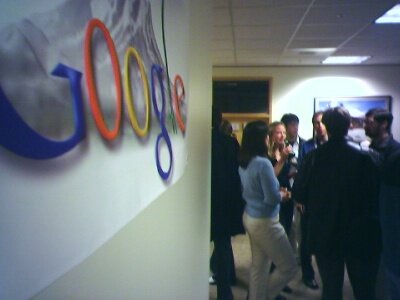
Via SEW blog
Related articles
- - 2004-11-21 18:37
- - 2004-10-23 10:13
- - 2004-11-12 13:15
-
Read what others are saying about this post on , or on or on .
November 18, 2004
By Olivier Duffez, November 18, 2004 at 09:56 AM in:
Google has launched a new version of its search engine dedicated to scholarly literature.
Google Scholar enables you to search specifically for scholarly literature, including peer-reviewed papers, theses, books, preprints, abstracts and technical reports from all broad areas of research. Google Scholar may be used to find articles from a wide variety of academic publishers, professional societies, preprint repositories and universities, as well as scholarly articles available across the web.
Just as with Google Web Search, Google Scholar orders your search results by how relevant they are to your query, so the most useful references should appear at the top of the page. This relevance ranking takes into account the full text of each article as well as the article's author, the publication in which the article appeared and how often it has been cited in scholarly literature.
Here is the first result given by Google Scholar for the query 'The best search engine':
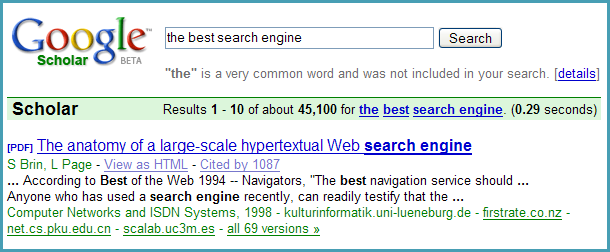
Google Scholar also automatically analyzes and extracts citations and presents them as separate results, even if the documents they refer to are not online. This means your search results may include citations of older works and seminal articles that appear only in books or other offline publications.
You can also search by author's name by typing author: and the author name. Check out .
Google welcomes questions or comments about Google Scholar:
We recognize the debt we owe to all those in academia whose work has made Google itself a reality and we hope to make Google Scholar as useful to this community as possible. We believe everyone should have a chance to stand on the shoulders of giants.
Via .
Related article
-
Read what others are saying about this post on , or on or on .
By Olivier Duffez, November 18, 2004 at 09:48 AM in:
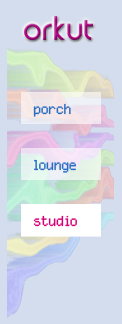 Google launched Orkut Media, "a brand new feature that will present a fresh set of columns and photographs every week. They will cover the topics that rule our daily thoughts – sex, food, politics, art, race, you name it. What you see in orkut media can make you laugh or think. In the end, we hope it's something real to connect with in this virtual world."
Google launched Orkut Media, "a brand new feature that will present a fresh set of columns and photographs every week. They will cover the topics that rule our daily thoughts – sex, food, politics, art, race, you name it. What you see in orkut media can make you laugh or think. In the end, we hope it's something real to connect with in this virtual world."
Check out the FAQ for more details about Orkut Media.
via Google Blogoscoped
no comment - no trackback
Read what others are saying about this post on Bloglines, or on Feedster or on Technorati.
November 12, 2004
By Olivier Duffez, November 12, 2004 at 01:15 PM in:
According to the King County Journal, as , the new software development office will employ up to 200 workers.
The Silicon Valley company recently signed a multiyear lease to initially occupy the entire fourth floor of the Central Way Plaza building at 720 Fourth Ave. in downtown Kirkland.
Google also agreed to take an option to occupy the third floor of the building as well by the end of November 2006, which would give the company a total of 46,000 square feet of office space.
The company has only about a dozen workers in the Puget Sound region at a couple of small sales offices -- one at Kirkland's Carillon Point and one in Seattle's South Lake Union area.
Eileen Rodriguez, a spokeswoman for Google at the company's headquarters in Mountain View, Calif., confirmed in an e-mail the company's plans to open a software development office in Kirkland, but was unable to provide details regarding hiring plans here.
Related articles
-
Read what others are saying about this post on , or on or on .
November 11, 2004
By Olivier Duffez, November 11, 2004 at 11:46 AM in:
Google has just updated the number of pages officially indexed, displayed on its homepage, from 4,285,199,774 to 8,058,044,651 pages. Since a long time many queries lead to more than 4 billions results (this is only an approximation). As Andy Beal , "The update obviously helps explain all of the recent activity by Googlebot and ensures that Google retains the title of the largest index".
As usual, the date of this announcement is chosen precisely by Google. Today is also the launch of MSN Search Beta, one of Google's competitors. Coincidence?
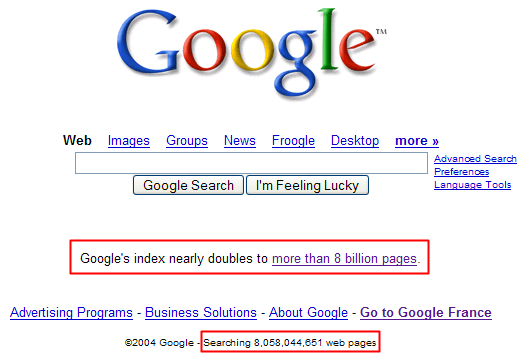
On google.com homepage you can read "Google's index nearly doubles to more than 8 billion pages" with a link to Bill Coughran's on the official Google blog.
Google's index nearly doubles.
You probably never notice the large number that appears in tiny type at the bottom of the Google home page, but I do. It's a measure of how many pages we have in our index and gives an indication of how broadly we search to find the information you're looking for. Today that number nearly doubled to more than 8 billion pages. That made me smile.
Comprehensiveness is not the only important factor in evaluating a search engine, but it's invaluable for queries that only return a few results. For example, now when I search for friends who previously generated only a handful of results, I see double that number. These are not just copies of the same pages, but truly diverse results that give more information. The same is true for obscure topics, where you're now significantly more likely to find relevant and diverse information about the subjects. You may also notice that the result counts for broader queries (with thousands or millions of results) have gone up substantially. However, as with any search engine, these are estimates, and the real benefit lies with the queries that generate fewer results.
The documents in Google's index are in dozens of file types from HTML to PDF, including PowerPoint, Flash, PostScript and JavaScript. Together these pages represent a good chunk of the world's information, but hardly all of it. That's why we keep building more advanced systems for crawling the web and creating more sophisticated indices to sort what we find. So 8 billion pages is a milestone worth noting, but it's not the end of the road. The real test is how well we do in finding what you want from within those pages. We'll keep improving that too.
Bill Coughran V.P., Engineering
Other blog coverage:
-
Read what others are saying about this post on , or on or on .
November 3, 2004
By Olivier Duffez, November 3, 2004 at 09:44 AM in:
Google has a Zeitgeist just for todays elections.
As the last week before the election winds down, the search results for Google News offer a bit of insight into people's campaign interests.
The term "zeitgeist" comes from the German "Zeit" meaning "time" and "Geist" meaning "spirit". The term is defined in English by Merriam-Webster's Collegiate® Dictionary as "the general intellectual, moral, and cultural climate of an era."

-
Read what others are saying about this post on , or on or on .
November 1, 2004
By Olivier Duffez, November 1, 2004 at 08:11 PM in:
 Google tells on the homepage that it is currently searching 4,285,199,774 web pages. and you'll find about 6,050,000,000 results!
Google tells on the homepage that it is currently searching 4,285,199,774 web pages. and you'll find about 6,050,000,000 results!
Source:
Related articles
-
Read what others are saying about this post on , or on or on .


 Georges Harik, Director of (new products) at Google,
Georges Harik, Director of (new products) at Google, 



 Douwe Osinga is working for Google on the Google File System architecture. If you don't know what is the Google File System (GFS) you should read this paper called
Douwe Osinga is working for Google on the Google File System architecture. If you don't know what is the Google File System (GFS) you should read this paper called 


 Google launched
Google launched 

 Google tells on the homepage that it is currently searching 4,285,199,774 web pages. and you'll find about 6,050,000,000 results!
Google tells on the homepage that it is currently searching 4,285,199,774 web pages. and you'll find about 6,050,000,000 results!